Vietnam is a cultural haven for everyone. The legends and myths that lurk in every nook and cranny go back a thousand years. In Vietnam, legends are not just stories passed down from generation to generation. Vietnamese culture has its roots in legends. Several Vietnamese traditions were born out of belief in these legends. There are beliefs related to the country's natural phenomena such as the arrival of the monsoon season, cultural festivals, the origins of the natives and temples and holy places. Moral lessons combined with legendary stories have made Vietnam's folklore unparalleled.
The Vietnamese creation myth
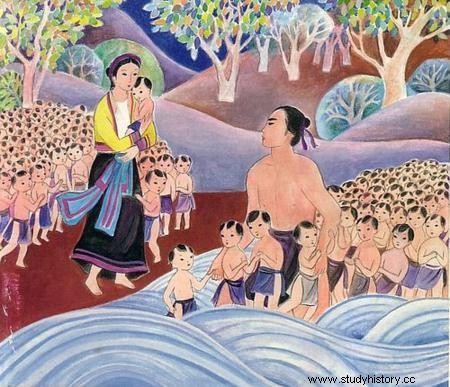
Let's start with how the Vietnamese think they came to be. Lac Long Quân, whose name literally means Dragon King of Lac, was the king and water dragon of ancient Vietnam. He built two large palaces - one in the sea and the other in the mountains. According to legend, he married a mountain fairy named Âu Cơ. Âu Cơ gave birth to a sack containing one hundred eggs, of which one hundred children were born. One day Lạc Long Quân told his wife that since he had come down from dragons and she was a fairy, they were incompatible as fire and water. Continuing in harmony was an impossible task, so they decided to divorce. Lạc Long Quân took half of his children and went to the sea palace, while Âu Cơ took the other half and went to the mountain palace. The children who grew up with their mother on land are believed to be how the Vietnamese came to be. The eldest son, who went with his mother to the mountains, later claimed to be Quan's successor. Several cities in Vietnam are named after him, and school books tell of the Vietnamese creation myth.
Son Tinh, Thuy Tinh and the Vietnamese Monsoons
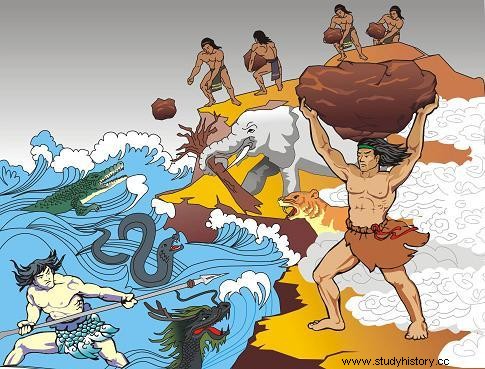
The Vietnamese believe that the monsoon season is a result of the old rivalry between Son Tinh and Thuy Tinh. The son Tinh was the mountain country while Thuy Tinh was the water. The king of the country, Hunh Vuong VI, had a beautiful daughter whom he wanted to marry the best possible suitor. After consulting the court and his advisers, he issued a proclamation announcing that he was seeking a suitable husband for the daughter. A number of princes came from across the country, but the king remained impressed. And then one fateful day, two extremely handsome nobles, Son Tinh and Thuy Tinh, came to seek the princess' hand. When he asked about the princes, the king found that they were both equally talented, prominent and with good reputation. Since the king could not decide who to choose for the daughter, he sent them both away and asked them to come back the next day, claiming that whoever showed up with the bees' wedding gifts would be allowed to marry the princess.
It was Son Tinh who first appeared with wedding gifts that impressed the king. And then the king agreed to marry his daughter. But the arrangements had barely been made when Thuy Tinh showed up with presents. Thuy Tinh's ego would not let him accept his defeat so easily. So he challenged Son Tinh to a contest to decide who was actually stronger and thus more deserving of the king's daughter. But Son Tinh ignored Thuy Tinh, making the water even more irritated. Thuy Tinh ordered the rivers, oceans and streams of the country to overflow and flood the entire area in search of revenge. In an instant, the land was turned into a crowded river. The storm and the water raged every hour every day, destroying homes, crops and lives. However, the person who was meant to harm all of this was safe. His son Tinh had retired to his palace high up in the mountains where the water could not touch him. As the days passed, Thuy Tinh finally admitted that Son Tinh could not be defeated, and so he withdrew all the water. But as the person he is, Thuy Tinh was never at peace with his defeat, so every year he recreates the battle of the flood, which makes it rain and the masses of water flow over, that is how the Vietnamese believe the monsoons came to their land.
The legend of Hoan Kiem Lake

Lake Hoan Kiem in Vietnam is also known as Lake of the Returned Sword or Lake of the Restored Sword. And yes, the name comes from an ancient legend associated with the lake.
In 1428, Lê Lợi became emperor after defeating Ming China. He was sailing on Hoan Kiem Lake when Kim Qui, Golden Turtle God appeared and asked for the emperor's magic sword. Dragon King, Long Vương had given Lê Lợi a magic sword to fight Ming China. To mark the return of the sword to its rightful owner, the emperor decided to commemorate the event by changing the name of the lake from Green Water (the former name) to Lake of the Returned Sword. In the middle of the lake where a small island is located, the turtle tower, Tháp Rùa was erected. The lake itself is home to a small number of large softshell turtles, the place that the Vietnamese believe brings good luck.
The Three Kitchen Gods and Kitchen God Day
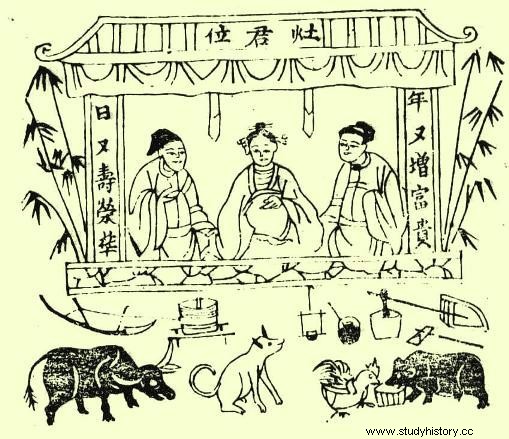
In Vietnam, the natives believe in the three kitchen gods, collectively known as Tao Quan. According to legend, the gods are present in the kitchen of every house, observing everything that happens there. As the lunar year draws to a close, they report to the Jade emperor, Ngoc Hoang, who is the supreme deity in the Taoist sky. The legend of the kitchen gods originates from the story of Trong Cao, Thi Nhi and Pham Lang. Trong Cao and Thi Nhi were husband and wife. The years passed, but they had no children. This caused them to quarrel frequently, and one day, after a violent fight, Trong Cao threw his wife out of their home. Thi Nhi did not return, and after wandering around for a while without food and shelter, he met Pham Lang. They got married.
After a while, Trong Cao realized how wrong he was in treating his wife and went looking for her. Time and money were spent finding her until it ran out and he started begging for food. As he wandered around in rags, he came across Thi Nhi's house and asked for food. The woman recognized her husband and took him in and fed him. Phạm Lang then came home. Thi Nhi did not want him to see her ex-husband in their home and be branded an infidel, so she hid him in a large pile of hay. Pham Lang set fire to the hay to make manure. Inside the hay, Trong Cao did not dare to move or cry since he was sure the man would kill Thi Nhi for having caught her with another man. And Thi Nhi does not dare say anything for the same reason, nor did she want her ex-husband to die because of her. So she jumped into the fire. Pham Ling, shocked by his wife's actions, followed her into the fire and believed he was responsible for his wife's death. When the people heard about what was happening, they praised the dead for their noble deeds. The Jade emperor raised the spirit to gods, and thus the three souls became the three kitchen gods or Tao Quan.
To date, every 23 rd December (end of lunar year), the Vietnamese hold a celebration to say goodbye to the three gods on their journey to the Jade Emperor's palace in heaven. The homes are cleaned and decorated, delicacies are prepared and the altar is adorned with fresh flowers and fruit.
Toads and rain
Long ago, Vietnam suffered a devastating drought. Without rain, the ground cracked, plants and animals died. So a toad decided to go to heaven to meet God and tell him how the earth died. On the way he met a bee, a crab, a bear, a tiger and a fox who joined him on the journey.
When they came to the gates of heaven, the animals saw that a drum lay there. The toad asked his friends to hide and wait a while. He took the drum and started beating it, and made the thunderous spirit come out. The sight of a small toad beating the drum did not confuse the spirit, and the spirit reported it to God. However, it was annoying enough to God, so he ordered a cock to chop the toad to death. A cycle of events followed - the rooster tried to attack the toad, but the fox came and killed the rooster to defend his friend. Then a dog was ordered to kill the fox, but in vain, because the bear came out and killed the dog. Furious, God sent the thunder spirit itself to punish the animals. However, the spirit was stung by the bee, dressed by the crab and almost beaten by the tiger. Finally, God had to invite the animals to his court where he listened to their situation. When he saw how the animals had handled the problems at the gate, God became even more afraid that the earth would rebel against him. So he sent the animals on their way and asked the toad to grind its teeth when they needed rain and water. And so to this day, the Vietnamese believe that the place of a toad was a good sign and will bring them rain.
The Legend of Truong's Wife

Near the Hoang River in the village of Vu Dien in Vietnam stands the temple of Truong's wife. When Truong married, he was recruited to go and fight in the war just six months later. His wife was pregnant when he left. She delivered a boy she called Dan. Truong did not return until the child was a few years old. During his absence, the child's mother pointed to her own shoulder and told that it was his father. Three years later, Truong returned, much to the confusion of his child. When Truong told him he was his father, the child claimed that all he already had was a father who always sat, walked or moved with his mother. Truong assumed that his wife had an extra marital relationship in his absence, and he began to accuse and abuse his wife. Unable to convince her husband that she had been loyal, she jumped into the Hoang River in despair. That night, when the shadows came, the child pointed to his father's shadow and exclaimed that it was his father. It finally dawned on Truong that his wife had used a shadow as a surrogate father for their child. Consumed by guilt, he constructed an altar on the edge of the river and offered regular offerings to help her soul rest in peace. The villagers later built a temple to honor the woman.
The Legend of Hon Vong Phu
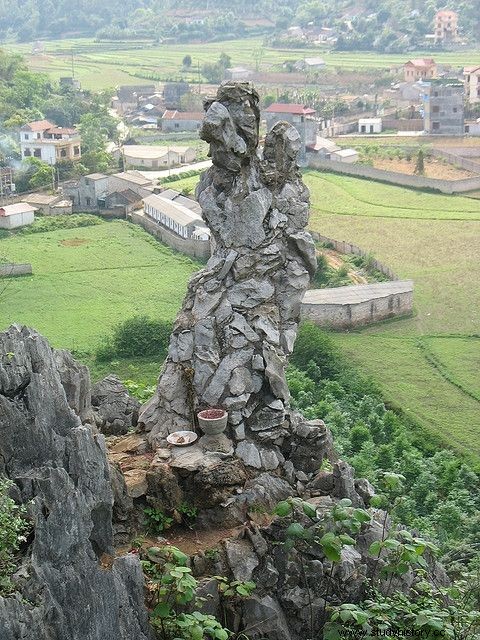
In Vietnam's Lang Son Province, Hon Vong Phu Mountain is also known as the mountain of the woman waiting for her husband. A stone in the shape of a woman with a child in her arms stands alone on the mountain top in an eternal guard. According to legend, there was a poor family in a small village in Vietnam - a couple with their two children. The couple went to work every day while leaving the children at home. The son was asked to take good care of the little sister. One day when the boy was cutting sugar cane, the knife slipped out of his hands and cut his sister's head. The girl fainted and the boy, who was terrified that he had killed his sister, fled. Years later, they met again without realizing that they were siblings. They fell in love and got married.
One morning the man found his wife in the backyard and dried her hair. He saw the scar a long time ago, and upon request, the woman said that her brother had beaten her with a knife and then ran away never to be seen again. With growing fear, the man asked about the name of the family and the village. Consumption of shame and terror, the man enlisted in the army to stay away from the family and find redemption on the battlefield. As for the wife, she was waiting for him to return with her son while she was unaware of the truth. Every night, for many years, she carried the child up the mountain to see if there were any signs that her husband would return. One day, after exhaustion, she stood motionless on the mountain top with her eyes fixed on the horizon. Legend has it that she was turned to stone, immortalized while waiting for her husband.
The Legend of the Milky Way
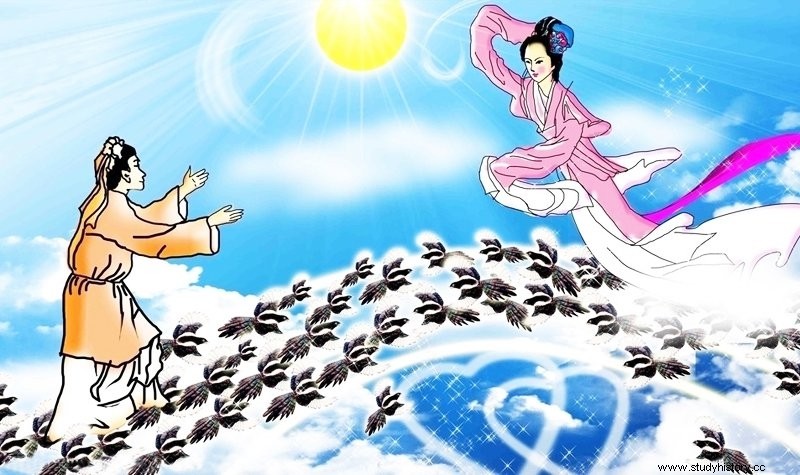
In Vietnamese culture, it is believed that the Milky Way is actually where two lovers meet. Chuc Nu was the beautiful daughter of the Jade emperor who ruled the heavens. She was extremely skilled at weaving beautiful tapestries. It is said that she braided the rays of the sun together with the moonlight and further adorned it with twinkling stars. From these creations she made her father's clothes and fairy clothes. Chuc Nu was expected to marry in a suitable match, but none of the suitors who came to seek her hand made her happy. One summer day, she saw her father's shepherd, Nguu Lang, running the king's cattle along the banks of the Milky Way. There was love in sight for both of them. They married the Emperor's blessing.
However, their love and affection for each other caused them to neglect their work- Chuc Nu of the weaving and Nguu Lang of the royal cattle. The weaving gathered dust and the cattle wandered into the crops of the land and destroyed them. Repeated warnings from the emperor went unnoticed. In the end, the emperor decided to banish Nguu Lang to the opposite side of the Milky Way to look after the cattle. The princess became depressed, and when she saw this, her father took pity on her and decided that they could meet on the seventh day of the seventh month. So every year, Chuc Nu waits on one side of the Milky Way and asks the crows to help her reunite love. Then crows from all over the world come together to build a bridge so that the stars who crossed lovers could meet. The Vietnamese believe that this was the reason why crows migrate during the seventh month. A light rain always falls during this month which the natives call Mua Ngau. They believe it is the young couple's happy tears to be reunited.
In Vietnam, legends are relevant to this day. Folklore is expressed through festivals, holy places, rituals and storytelling that pay homage to these legends. The stories are also one of the ways that bind the natives to their country.
